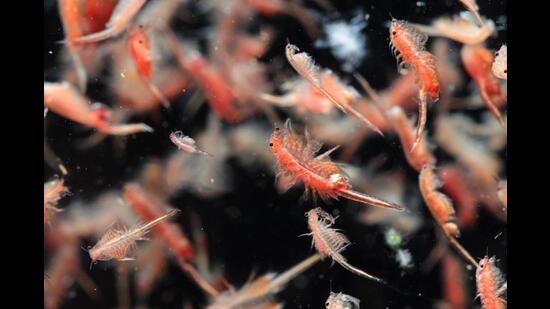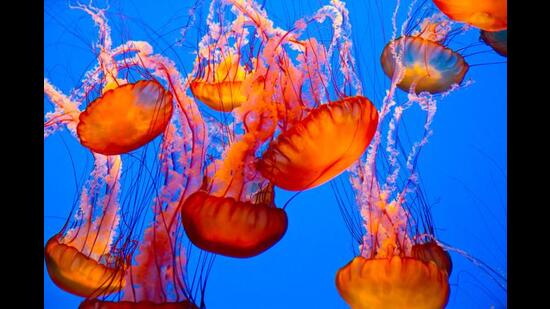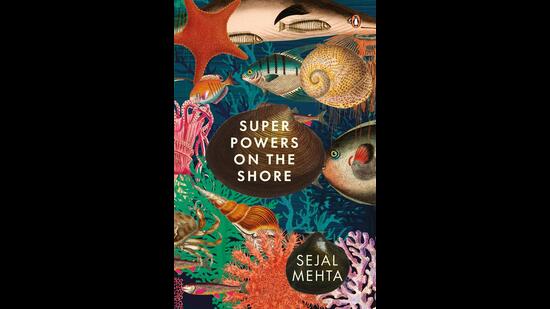Review: Superpowers on the Shore by Sejal Mehta
In his book, Other Minds – The Octopus and the Evolution of Intelligent Life, author Peter Godfrey-Smith describes meeting an octopus as “meetings across the tree of life”. The last time we had a common ancestor between the human and an octopus may have been 600 million years ago. But octopuses are intelligent, displaying curiosity and varied problem-solving ability. And thus, Godfrey-Smith writes that an octopus is the closest we will ever come to meeting an “intelligent alien”.
The idea that there is a vast gap between us and a sea creature doesn’t mean that the animal is not worthy or intelligent, the author asserts. Yet, because animals of the sea are so different from us, they are often othered. These are not animals that will wag their tails when they see us, nor do they acknowledge human intelligence; indeed they seem to exist on a different, watery planet. If we were to make a compendium of insults that are animal-inspired, many of them could refer to the way we look at sea creatures: venomous as a (sea) snake; slippery as an eel; worm-like (such as any manner of sea-species); slimy. Yes, sea animals can often be slimy, and sometimes dangerous. So what?

This seems to be the tone of Sejal Mehta’s book, Superpowers on the Shore. It describes creatures that live close to where we are – on coastlines and beaches chock-full of tourists, walkers and fisherfolk – yet often remain unseen. But, the author argues, these animals have evolved a set of “superpowers” to get by in often harsh environs which are simultaneously exposed to both land and sea. She explores “powers” like invisibility, hunting and camouflage. A super villain also makes a cameo. The coastlines of Mumbai have a huge starring role in this book – these are places for lovers, for jogs, for solitude, and also for octopuses that sometimes run away, changing colour as they do so. A wild animal spotted on a sandy walk may appear to be a random thing but it is a creature with will, intent and surprising survival skills.
Presented in bite-sized chapters, this book is a collection of appetizers that aims to make you fall in love with the sea and its spawn. The fact that the creatures like scorpionfish or cone snails don’t seem to be very interested in us (possibly the reason why we revile them) does not deter Mehta. She is interested. She walks on the shore, talks to researchers, gets stung or plankton-ed, but comes away grinning. On the tentacled Man O’ war, she writes: “The cnidarian defence, like most other powers in this book, isn’t targeted at humans. It’s not about us at all.”
READ MORE: Excerpt from Superpowers on the Shore by Sejal Mehta

Wonder and humility seem to be Mehta’s weapons of choice that arbitrate between the mundane and exciting aspects of a coastline (and broadly, of life). On jellyfish, often dismissed as brainless, Mehta asks why we must always assign purpose to other creatures. Maybe they’re not wanderers, but explorers, she writes, constantly floating onwards as they are. There is another striking passage on Noctiluca, light bearing plankton, which sucks out oxygen from all its surroundings. Mehta watches the phenomena, with a touch of sadness, the beaches and her hands in the water shimmering with the plankton. The Noctiluca pull away life from the beaches, but there is no mal-intent here, she says.
The book would have been even stronger if it had distribution maps of the species it talks about, and more connecting threads between the chapters. I also couldn’t find credits for the illustrations.

But this is an unusual book in that the author seems to be rebelling against usual tomes of science writing, which are usually bone dry and superior-sounding. Superpowers is structured with non-fiction passages alongside pages of fiction, the latter starring a pushy know-it-all hermit crab character. Not all of the banter is successful, but in my knowledge, this format is a first for book-length nature works in India, and will be greatly enjoyable for the lay reader. Similar to Janaki Lenin’s assured dry wit (Every Creature has a Story), Sejal has found her very own narrative voice. She is not above letting you disagree with the things she finds fascinating. ‘We live in this world when we love it,’ writes Rabindranath Tagore in Stray Birds. To that, Mehta and other explorers will agree.

Those who don’t like wonder as a way of envisioning the world may ask why they should read a book on slimy creatures. I imagine the ocean, depicted as an adventurer in this book, may stick out her tongue, and say sibilantly: “Why not?”
Neha Sinha is a conservation biologist and the author of Wild and Wilful- Tales of 15 Iconic Indian Species
The views expressed are personal
Enjoy unlimited digital access with HT Premium
Subscribe Now to continue reading

In his book, Other Minds – The Octopus and the Evolution of Intelligent Life, author Peter Godfrey-Smith describes meeting an octopus as “meetings across the tree of life”. The last time we had a common ancestor between the human and an octopus may have been 600 million years ago. But octopuses are intelligent, displaying curiosity and varied problem-solving ability. And thus, Godfrey-Smith writes that an octopus is the closest we will ever come to meeting an “intelligent alien”.

The idea that there is a vast gap between us and a sea creature doesn’t mean that the animal is not worthy or intelligent, the author asserts. Yet, because animals of the sea are so different from us, they are often othered. These are not animals that will wag their tails when they see us, nor do they acknowledge human intelligence; indeed they seem to exist on a different, watery planet. If we were to make a compendium of insults that are animal-inspired, many of them could refer to the way we look at sea creatures: venomous as a (sea) snake; slippery as an eel; worm-like (such as any manner of sea-species); slimy. Yes, sea animals can often be slimy, and sometimes dangerous. So what?

This seems to be the tone of Sejal Mehta’s book, Superpowers on the Shore. It describes creatures that live close to where we are – on coastlines and beaches chock-full of tourists, walkers and fisherfolk – yet often remain unseen. But, the author argues, these animals have evolved a set of “superpowers” to get by in often harsh environs which are simultaneously exposed to both land and sea. She explores “powers” like invisibility, hunting and camouflage. A super villain also makes a cameo. The coastlines of Mumbai have a huge starring role in this book – these are places for lovers, for jogs, for solitude, and also for octopuses that sometimes run away, changing colour as they do so. A wild animal spotted on a sandy walk may appear to be a random thing but it is a creature with will, intent and surprising survival skills.
Presented in bite-sized chapters, this book is a collection of appetizers that aims to make you fall in love with the sea and its spawn. The fact that the creatures like scorpionfish or cone snails don’t seem to be very interested in us (possibly the reason why we revile them) does not deter Mehta. She is interested. She walks on the shore, talks to researchers, gets stung or plankton-ed, but comes away grinning. On the tentacled Man O’ war, she writes: “The cnidarian defence, like most other powers in this book, isn’t targeted at humans. It’s not about us at all.”
READ MORE: Excerpt from Superpowers on the Shore by Sejal Mehta

Wonder and humility seem to be Mehta’s weapons of choice that arbitrate between the mundane and exciting aspects of a coastline (and broadly, of life). On jellyfish, often dismissed as brainless, Mehta asks why we must always assign purpose to other creatures. Maybe they’re not wanderers, but explorers, she writes, constantly floating onwards as they are. There is another striking passage on Noctiluca, light bearing plankton, which sucks out oxygen from all its surroundings. Mehta watches the phenomena, with a touch of sadness, the beaches and her hands in the water shimmering with the plankton. The Noctiluca pull away life from the beaches, but there is no mal-intent here, she says.
The book would have been even stronger if it had distribution maps of the species it talks about, and more connecting threads between the chapters. I also couldn’t find credits for the illustrations.

But this is an unusual book in that the author seems to be rebelling against usual tomes of science writing, which are usually bone dry and superior-sounding. Superpowers is structured with non-fiction passages alongside pages of fiction, the latter starring a pushy know-it-all hermit crab character. Not all of the banter is successful, but in my knowledge, this format is a first for book-length nature works in India, and will be greatly enjoyable for the lay reader. Similar to Janaki Lenin’s assured dry wit (Every Creature has a Story), Sejal has found her very own narrative voice. She is not above letting you disagree with the things she finds fascinating. ‘We live in this world when we love it,’ writes Rabindranath Tagore in Stray Birds. To that, Mehta and other explorers will agree.

Those who don’t like wonder as a way of envisioning the world may ask why they should read a book on slimy creatures. I imagine the ocean, depicted as an adventurer in this book, may stick out her tongue, and say sibilantly: “Why not?”
Neha Sinha is a conservation biologist and the author of Wild and Wilful- Tales of 15 Iconic Indian Species
The views expressed are personal
Enjoy unlimited digital access with HT Premium
Subscribe Now to continue reading

